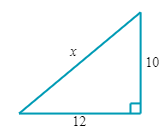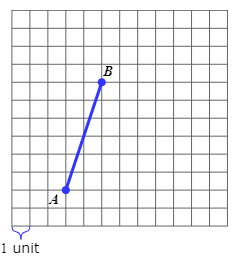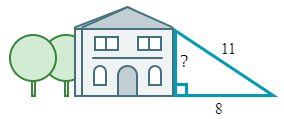Simplify.
-2v^5(-6v^3)
12v^8
Write this in scientific notation.
7770
7.77 * 10^3
\sqrt11*\sqrt11
11
True or False: You can use the Pythagorean theorem without a right triangle.
False
Rewrite as a positive exponent only.
(4^-2)^-9
4^18
Write this in standard form.
8.64xx10^6
8,640,000
\sqrt3*\sqrt15
3\sqrt5
True or False: 5, 12, 13: These values give you an obtuse triangle.
False
Simplify.
(u^6)^-3
1/u^18
Calculate.
(7.2xx10^-6)(6xx10^3)
4.32xx10^-2
Simplify.
\sqrt(64y^11)
8y^5\sqrty
Round to the nearest hundredth.

15.62
Simplify.
(-2a^4b)^4
16a^16b^4
Calculate.
(2.4xx10^-5)/(6xx10^3)
4xx10^-9
Simplify.
\sqrt(343x^3y^2)
7xy\sqrt(7x)
Find the distance between the points A and B given below. (That is, find the length of the segment connecting A and B.) Round your answer to the nearest hundredth.

6.32 units
Simplify.
(10y^2z^3)/(25y^4z)
(2z^2)/(5y^2)
Calculate. Write your answer in scientific notation.
(4.654xx10^9)-(1.9xx10^8)
4.464xx10^9
3\sqrt98xx\sqrt48
84\sqrt6
An 11-ft ladder leans against the side of a house. The bottom of the ladder is 8 ft from the side of the house. How high is the top of the ladder from the ground? If necessary, round your answer to the nearest tenth.

7.5 ft